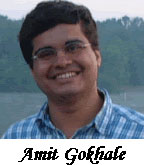
Status:
Graduated July 8, 2005, Employed by BP 2005
Research Area: Theoretical Methods in Catalysis, Surface Science and Semiconductor Applications
Hometown: Mumbai, India
Undergraduate Studies: University of Mumbai
Research Summary:
Low Temperature Water Gas Shift Reaction – Combining First Principles with Microkinetic Modeling
The water gas shift reaction (WGSR), CO + H2O → CO2 + H2 is an industrially important route to H2 production and plays an important role in many current technologies such as methanol synthesis, methanol steam reforming, ammonia synthesis, coal gasification, as well as fuel cell technology. Using quantum chemical methods such as Density Functional Theory (DFT), I have studied this reaction extensively on a series of ten late transition metals. This study has helped us to determine the characteristics that define a good WGS catalyst, and hence allowed us to screen for potentially active WGS catalysts.
Since Cu-based catalysts are used in industry for WGSR I have calculated detailed minimum energy paths for all the elementary steps on a Cu(111) surface using DFT and built a robust microkinetic model for WGSR on copper catalysts using the DFT-generated parameters. This model conclusively proves that the carboxyl mechanism is the dominant mechanism on this surface and points out that the formate species is essentially a spectator on the catalytic surface under typical WGSR conditions.
Apart from studying the WGSR, I have used quantum chemical methods and microkinetic modeling for studying a number of other chemical reactions such as Fischer Tropsch Synthesis, methanol synthesis and decomposition, NH3 decomposition, and also investigated some of the aspects of processes related to III-V semiconductors such as growth, interdiffusion and passivation.
-in collaboration with-
Shampa Kandoi, Lars Grabow, Rahul Nabar, Mariam Gonzalez, Zhiyan Liu
Publications:
A. A. Gokhale, J. A. Dumesic, and M. Mavrikakis, “DFT studies of formation of subsurface carbon on 3d-transition metals”, to be submitted to Surf. Sci. Lett.
S. Kandoi, J. Greeley, M. A. Sanchez-Castillo, S. T. Evans, A. A. Gokhale, J. A. Dumesic, M. Mavrikakis “Direct Prediction of Experimental Methanol Decomposition Rates on Platinum from First Principles”, Top. Catal
A. A. Gokhale and M. Mavrikakis, “Methane Formation on Fe(110) and Co(0001) surfaces: Comparative DFT studies”, Prepr. Pap.-Am. Chem. Soc., Div. Fuel Chem, 2005, 50(1), 149-150.
N. Schumacher, A. Boisen, S. Dahl, A. A. Gokhale, S. Kandoi, L. C. Grabow, J.A. Dumesic, M. Mavrikakis, I. Chorkendorff, “Trends in low-temperature water-gas shift reactivity on transition metals”, J. Catal., 2005, 229, 265
A. A. Gokhale, S. Kandoi, J. P. Greeley, M. Mavrikakis, J. A. Dumesic, “Molecular-level Descriptions of Surface Chemistry in Kinetic Models using Density Functional Theory”, Chem. Eng. Sci., 2004, 59, 4679
Z.Y. Liu, A. A. Gokhale, M. Mavrikakis, D.A. Saulys, T.F. Kuech, “Modifications of the electronic structure of GaSb surface by chalcogen atoms: S, Se and Te”, J. Appl. Phys., 2004, 96, 4302
A. Gokhale, G. W. Huber, J. A. Dumesic, M. Mavrikakis, “Effect of Sn on the reactivity of Cu surfaces”, J. Phys. Chem. B. 2004, 108, 14062
S. Kandoi, A. A. Gokhale, L. C. Grabow, J. A. Dumesic, M. Mavrikakis, “Why Au and Cu are More Selective Than Pt for Preferential Oxidation of CO at Low Temperature”, Catal. Lett. 2004, 93, 93
A. Gokhale, J. D. Schieke, M. Mavrikakis, T. F. Kuech, “Density Functional Theory Studies of GaN Surface Reactivity”, Navigator (centerfold), 2003, 14
J. Greeley, A. Gokhale, J. Kreuser, J. A. Dumesic, H. Topsøe, N-Y. Topsøe, M. Mavrikakis, “CO Vibrational Frequencies on Methanol Synthesis Catalysts: a DFT study”, J. Catal. 2003, 213, 63







